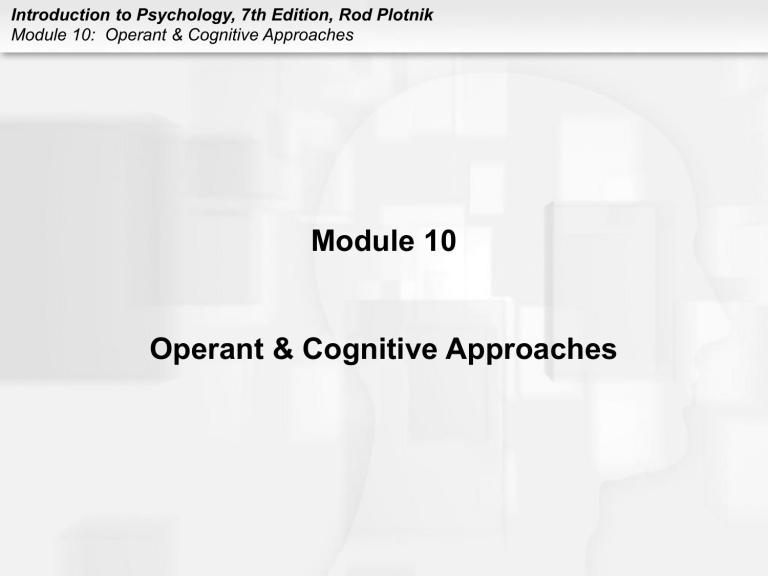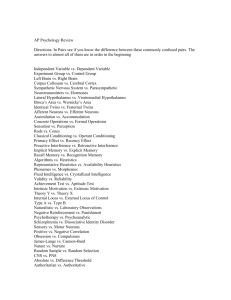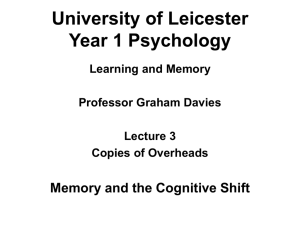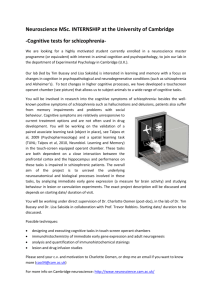Introduction to Psychology, 7th Edition, Rod Plotnik Module 10

Introduction to Psychology, 7th Edition, Rod Plotnik
Module 10: Operant & Cognitive Approaches
Module 10
Operant & Cognitive Approaches
Introduction to Psychology, 7th Edition, Rod Plotnik
Module 10: Operant & Cognitive Approaches
Operant Conditioning
– the consequences that follow some behavior increase or decrease the likelihood of that behavior’s occurrence in the future
– BICOC (behavior is contingent on consequences)
– Goal-directed behavior
– Goal: increase or decrease the rate of some response
– Voluntary/emitted/performed response
• Edward Lee Thorndike (cats in the puzzle box)
Law of Effect-behaviors followed by positive consequences are strengthened, while behaviors followed by negative consequences are weakened
• Burrhus Frederic Skinner (Skinner box/rats)
– Invented the Air Crib and a Pigeon-guided missile
Thorndike states a general principle-Skinner explained how it worked and provided a way to measure
Introduction to Psychology, 7th Edition, Rod Plotnik
Module 10: Operant & Cognitive Approaches
Skinner Box
• Principles and procedures
– Skinner box
– automated to record the animal’s bar presses and deliver food pellets
– an efficient way to study how an animal’s ongoing behaviors may be modified by changing the consequences of what happens after a bar press
– 3 factors in operant conditioning of a rat
1. a hungry rat will be more willing to eat the food reward
2. operant response: condition the rat to press the bar
3. shaping : procedure in which an experimenter successively reinforces behaviors that lead up to or approximate the desired behavior
Introduction to Psychology, 7th Edition, Rod Plotnik
Module 10: Operant & Cognitive Approaches p215 SKINNER BOX
Introduction to Psychology, 7th Edition, Rod Plotnik
Module 10: Operant & Cognitive Approaches
OPERANT CONDITIONING (CONT.)
• Shaping (facing, touching, then pressing the bar)
– Facing the bar
• rat is put in box.
• when rat finally faces the bar, food pellet is released
• rat sniffs the food pellet
– Touching the bar
• rat faces and moves towards the bar
• another pellet is released.
• Rat eats then wanders. Returning to sniff for a pellet, another pellet is dropped into the cup.
Rat places a paw on the bar and another pellet is released.
Introduction to Psychology, 7th Edition, Rod Plotnik
Module 10: Operant & Cognitive Approaches
OPERANT CONDITIONING (CONT.)
• Shaping
– Pressing the bar
• When rat touches bar pellet is released. Rat eats and then puts paws back on bar and gets another pellet. Wait for rat to now push bar then release pellet.
• Rat soon presses bar over and over again to get pellets.
• Rat’s behavior was reinforced as the rat leads up to, or approximates, the desired behavior of bar pressing
Introduction to Psychology, 7th Edition, Rod Plotnik
Module 10: Operant & Cognitive Approaches
Virtual Rat
Introduction to Psychology, 7th Edition, Rod Plotnik
Module 10: Operant & Cognitive Approaches
Operant conditioning in the classroom
• Hot, hot…cold, cold activity
• Need one volunteer to step out of class for a moment
• Class chooses a behavior
• Volunteer returns
• Class shapes volunteer’s behavior by stating
“HOT, HOT” or “COLD, COLD”
Introduction to Psychology, 7th Edition, Rod Plotnik
Module 10: Operant & Cognitive Approaches
OPERANT CONDITIONING (CONT.)
• Immediate reinforcement
– reinforcer should follow immediately after the desired behavior
– if reinforcer is delayed, the animal may be reinforced for some undesired or superstitious behavior
• Superstitious behavior
– behavior that increases in frequency because its occurrence is accidentally paired with the delivery of a reinforcer
Introduction to Psychology, 7th Edition, Rod Plotnik
Module 10: Operant & Cognitive Approaches
OPERANT CONDITIONING (CONT.)
• Examples of operant conditioning
– Toilet training, food refusal, increasing study
• target behavior
• preparation
• reinforcers
• shaping
Introduction to Psychology, 7th Edition, Rod Plotnik
Module 10: Operant & Cognitive Approaches
REINFORCERS (CONT.)
• Consequences
– consequences are contingent on behavior
• Reinforcement
– consequence that occurs after a behavior and increases the chance that the behavior will occur again
• Punishment
– consequence that occurs after a behavior and decreases the chance that the behavior will occur again
Introduction to Psychology, 7th Edition, Rod Plotnik
Module 10: Operant & Cognitive Approaches
REINFORCERS (CONT.)
• Reinforcement
– Positive reinforcement
• refers to the presentation of a stimulus that increases the probability that a behavior will occur again
– Negative reinforcement
• refers to an aversive stimulus whose removal increases the likelihood that the preceding response will occur again
Introduction to Psychology, 7th Edition, Rod Plotnik
Module 10: Operant & Cognitive Approaches
Reinforcement & Punishment
Positive Reinforcement Negative Punishment
Reinforcement = increases behavior
Punishment = decreases behavior
Positive = giving / adding to
Negative = taking away
Positive Punishment Negative Reinforcement
1.
A child swears and is spanked.
2.
A person takes an aspirin to get rid of a headache.
3.
A teenager is put on restriction for taking the car without asking.
4.
A student studies and gets an A.
Introduction to Psychology, 7th Edition, Rod Plotnik
Module 10: Operant & Cognitive Approaches
Reinforcement = increases behavior
Punishment = decreases behavior
Positive = giving / adding to
Negative = taking away
Positive Reinforcement Negative Punishment
A Take-away
Positive Punishment
Spanking
Negative Reinforcement
Aspirin
Introduction to Psychology, 7th Edition, Rod Plotnik
Module 10: Operant & Cognitive Approaches
REINFORCERS (CONT.)
• Reinforcers
– Primary reinforcers
• stimulus such as food, water, or sex , that is innate ly satisfying and requires no learning on the part of the subject to become pleasurable
– Secondary reinforcers
• any stimulus that has acquired its reinforcing power through experience; secondary reinforcers are learned , such as by being paired with primary reinforcers or other secondary reinforcers ( Examples : coupons, money, grades, praise, pizza party, etc.)
Introduction to Psychology, 7th Edition, Rod Plotnik
Module 10: Operant & Cognitive Approaches
REINFORCERS (CONT.)
• Punishment
– Positive punishment
• refers to presenting an aversive (unpleasant) stimulus after a response
– Negative punishment
• refers to removing a reinforcing stimulus after a response
Introduction to Psychology, 7th Edition, Rod Plotnik
Module 10: Operant & Cognitive Approaches
Cognitive Learning
• Cognitive learning
– involves mental processes, such as attention and memory
Albert Bandura (Bobo doll)
– children who had watched the film of an adult modeling aggressive behavior played more aggressively than children who had not seen the film
– learning through observation or imitation
Introduction to Psychology, 7th Edition, Rod Plotnik
Module 10: Operant & Cognitive Approaches
COGNITIVE LEARNING
• Three viewpoints of cognitive learning
– against: B. F. Skinner
– Skinner said, “As far as I’m concerned, cognitive science is the creationism (downfall) of psychology”.
– in favor: Edward Tolman
– explored hidden mental processes
– cognitive map: a mental representation in the brain of the layout of an environment and its features
Introduction to Psychology, 7th Edition, Rod Plotnik
Module 10: Operant & Cognitive Approaches
COGNITIVE LEARNING (CONT.)
• Three viewpoints of cognitive learning
– in favor: Albert Bandura
– Bandura focused on how humans learn through observing things
• Social cognitive learning theory
– results from watching, and modeling and does not require the observer to perform any observable behavior or receive any observable reward
Introduction to Psychology, 7th Edition, Rod Plotnik
Module 10: Operant & Cognitive Approaches
COGNITIVE LEARNING (CONT.)
• Four processes: Attention, Memory, Imitation,
Motivation
– Attention
• observer must pay attention to what the model says or does
– Memory
• observer must store or remember the information so that it can be retrieved and used later
Introduction to Psychology, 7th Edition, Rod Plotnik
Module 10: Operant & Cognitive Approaches
COGNITIVE LEARNING (CONT.)
• Bandura’s social cognitive theory
• Four processes (cont.)
– Imitation
• observer must be able to use the remembered information to guide his or her own actions and thus imitate the model’s behavior
– Motivation
• observer must have some reason or incentive to imitate the model’s behavior.
Introduction to Psychology, 7th Edition, Rod Plotnik
Module 10: Operant & Cognitive Approaches
COGNITIVE LEARNING (CONT.)
• Insight learning
– Insight
• a mental process marked by the sudden and expected solution to a problem: a phenomenon often called the “ah-ha!” experience.
• Thorndike tried to show cats learned through insight
Introduction to Psychology, 7th Edition, Rod Plotnik
Module 10: Operant & Cognitive Approaches
BIOLOGICAL FACTORS
• Definition
– Biological factors
• refer to innate tendencies or predispositions that may either facilitate or inhibit certain kinds of learning
– Imprinting
• refers to inherited tendencies or responses that are displayed by newborn animals when they encounter certain stimuli in their environment






